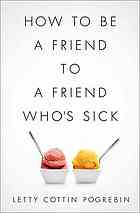
How to Be a Friend to a Friend Who's Sick
فرمت کتاب
ebook
تاریخ انتشار
2013
نویسنده
Mark P. Denbeauxنویسنده
Jon B. Gouldنویسنده
Mark P. Denbeauxنویسنده
Jon B. Gouldنویسنده
Letty Cottin Pogrebinناشر
PublicAffairsشابک
9781610392846
کتاب های مرتبط
- اطلاعات
- نقد و بررسی
- دیدگاه کاربران
نقد و بررسی

February 25, 2013
Pogrebin, a veteran feminist, author, and cofounder (with Gloria Steinem) of Ms. magazine, uses her experience with breast cancer—she was diagnosed in September 2009 at age 70—and nearly 80 interviews with friends and patients to craft this bluntly practical and gently humorous guide to the dos and don’ts of caring for the ill. The list of tips is formidably long, and includes plenty of helpful advice: Don’t ask “how” someone is feeling, ask “what” they’re feeling; never start a sentence with “Oh my God!”; and be sure to say things like, “Tell me how I can help,” and “I’m bringing dinner”—or ice cream, laughter, or pot (to which she gives “the grand prize for Most Restorative Gift”). There are also accounts of patients themselves, like writer Nora Ephron, who surprisingly chose to keep her fatal illness a secret from friends. But it’s the bravery and wisdom Pogrebin (Three Daughters) brought to her own battle that lifts this guide from a mere list of sickroom rules to invaluable lessons for sickness and health. Her cancer, she writes, “taught me the blessings of silence” and that there are times “when the kindest thing you can do” for the ill “is to confer upon them the honor of the ordinary.” Agent: David Kuhn, Kuhn Projects.

March 1, 2013
A cancer survivor channels her ordeal into reflections on the nature of empathy and friendships. Ms. magazine founding editor Pogrebin (Three Daughters, 2002, etc.) offers sound counsel to those comforting ailing friends. In 2009, a routine mammogram revealed a suspicious mass that not only changed the author's relationship to her body, but also the interactions with her friends, some of whom were hesitant to visit. Pogrebin's text serves her well as both an informative guide and an autobiographical chronicle. Evenly distributed throughout are personal interludes from her battle with breast cancer combined with helpful sections guiding those who are conflicted "when your role in the relationship is no longer easy or obvious." For many, she writes, worry for a friend's sudden or prolonged illness can be an intimidating, touchy subject, and communicating genuine concern could understandably be met with either graciousness or an irritable "Thank you for caring. Now leave me alone." The author's sharp advice illuminates many of the more common gray areas governing what to say to an ailing friend, appropriate visitation frequencies and durations, and proper gifting. She also provides tips for good behavior when a friend's parent or child is gravely ill. Much of this valuable "illness etiquette" comes from personal experience (Pogrebin's mother died of cancer) and from survival stories told to her by fellow patients. Illness, she writes, will often prove a friendship's mettle, and those who get it right will temper the unavoidable shame and embarrassment that often accompany serious health issues. A useful refresher course on navigating the complicated territory of compassionate companionship.
COPYRIGHT(2013) Kirkus Reviews, ALL RIGHTS RESERVED.

























دیدگاه کاربران